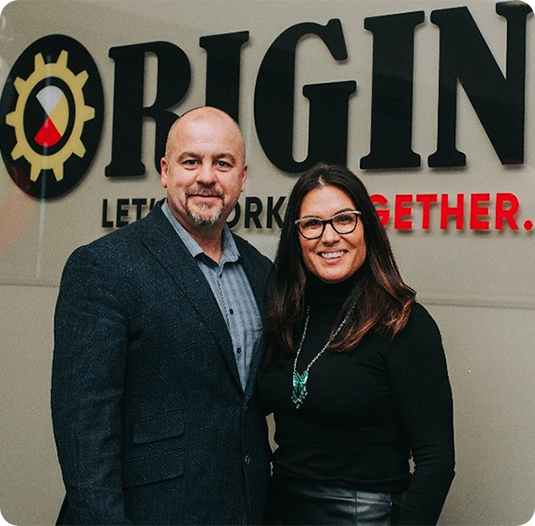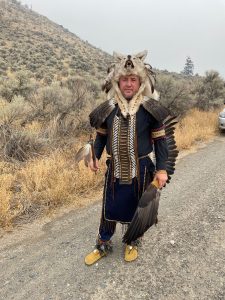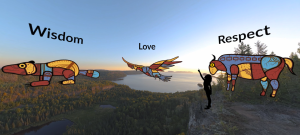Announcements
For press opportunities, please email info@immersivelink.ca.

The Cultural Compass: Navigating Career Success Through Indigenous Wisdom
As a proud member of the Red Rock Indian Band, I was born and raised on Lake Helen Reserve and am the co-founder of ORIGIN. I have always seen my cultural heritage as a cornerstone of my professional journey and leadership style. During Indigenous History Month, I reflect on how deeply our careers are intertwined with our cultural identities, and how embracing this connection can pave the way for profound professional and personal achievements.
Importance of Culture in Careers
Our personal values are developed over our life and are influenced by our experiences and culture. Understanding your values correlates to a strong sense of self which is an important trait when it comes to choosing your career path. Outside of a role itself, you must consider the type of team you want to be a part of and what type of organization you want to work for. Determining how to prioritize these factors can become a challenge if you are unsure of where your values lie.
Your personal experiences and knowledge are also reflective of who you are and what make you unique. The community you are surrounded by and your connection to culture drives how you show up in your personal and professional life. Having strong ties to your culture can empower you when it comes to showing up for yourself in the workplace. Being able to advocate for yourself isn’t always easy, so having a strong foundation can be especially important in these times.
Gathering knowledge throughout our life
Whether it be through wisdom passed on directly from the Elders within your community, your family, personal role models or friends, this knowledge is something that you will continue to carry with you. While there may be moments where you feel unsure of yourself, it becomes essential to rely on these messages of strength and determination shared with you.
For myself, I can reflect on times where I needed to rely on my community in which I keep and the knowledge I have received over the years, to guide me in making decisions and finding confidence in my abilities. As ORIGIN has continued to grow, ensuring that we were continuing to do work that aligned with our vision of supporting the Indigenous workforce had to remain at the forefront of any new project that came our way. In today’s fast world, it is very easy to be lead off track and lose focus of this but we’ve been able to remain focused and streamlined with our services. At the beginning of my journey, this was something that I relied on my mentors for, and now, as our team continues to grow, it is knowledge that I can pass down through them to continue carrying this vision forward.
Indigenous leaders paving the way
This quote is something I feel is not only relevant to our careers but also our personal life:
“We must trust our own thinking. Trust where we’re going. And get the job done.”
Wilma Mankiller, Former Principal Chief of the Cherokee Nation
To me, it captures the importance of self-reliance and confidence. In times when we may be questioning ourselves, it is so important to nurture these traits. When it comes to personal wellness and strength, the spiritual quadrant plays an important role. Looking at leaders like Wilma Mankiller, it is clear how their leadership exemplifies how cultural principles can guide career paths and leadership styles.
Another example of a strong leader who continues to highlight the intrinsic role that culture plays in her life is Mary Simon:
“My culture is my identity. It has shaped me into the person I am today and guides me as I walk my path in life.”
As the Governor General of Canada, she has found great success in her career and has many experiences through her professional trajectory that make her a reputable voice in this space. Mary Simon’s quote also highlights the role of culture in influencing decision-making and leadership in dynamic environments.

Quanah George from his IL experience, Making Deer Hoof Rattles.
Career Journeys of Indigenous Leaders
For decades, we’ve seen Indigenous leaders and communities continue to pave the way for younger generations to move forward into a working world that not only accepts but integrates Indigenous values. The changes we see today were not achieved without great challenges and resilience.
Leaders like Chief Wilton Littlechild have experienced first-hand the tragedies and abuse perpetuated through residential schools. With an extraordinary amount of resilience and courage, Wilton Littlechild used these experiences to motivate him to make a change.
“It’s been a challenging journey, but by walking in the footsteps of my ancestors, their wisdom and resilience have been my guideposts.”
Chief Wilton Littlechild, Cree Chief and Lawyer
Through his strong ties to Indigenous culture and knowledge passed know from his grandparents, Wilton proved how these connections can really impact you in finding your way. The legacy and teachings of his ancestors paved the roadmap he used to navigate the complexities of his career in a way not otherwise possible.
Overcoming challenges in your career journey
Regardless of the industry, your title, or the organization you work for, Indigenous professionals face challenges in the workplace that continue to persist today. Scenarios including lack of education on Indigenous culture and history, stereotypes, and racism can be extremely harmful and bring on many emotions. Whether you are one to speak your mind or hold back even when you disagree, feeling this tension and trying to remain optimistic can be an ongoing challenge.
As workplaces continue to move forward with initiatives to educate their staff and create a positive working environment, the unique contributions that the Indigenous workforce can bring should not be overlooked. Indigenous practices bring to the table a new perspective and approach to many scenarios. One example is shared by Dr. Evan Adams:
“As an Indigenous physician, integrating the teachings of my people with western medicine has not only been fulfilling but has allowed me to make a unique contribution to the field.”
Evan Adams, Chief Medical Officer of the First Nations Health Authority
This sentiment shared by Dr. Adams represents the innovative potential that exists when cultural heritage is incorporated into professional life. His unique insights and experiences have allowed him to make contributions that would not have been possible without his connection and belief in traditional practices.
Seeing individuals like the ones listed above, showcase not only the resilience and courage to work in these spaces while promoting the value and importance of Indigenous culture is both encouraging and inspiring.
Incorporating tradition into your working style
Leading with and incorporating traditional values is always at the forefront when it comes to my working style. Our company values are based on the Seven Sacred Teachings and guide our team in the ways we work with community and with each other. It is important to me that each member of our team feels valued not only in what they contribute to their work but as an individual, as we all have a hand in making “the ORIGIN wheel go round.” We start each week with a sharing circle to allow everyone to share a little more about themselves and create a team-oriented environment and monthly check ins with each employee is a priority for me. Take care of your employees!

Screencap from the ImmersiveLink7 experience that highlights the 7 Sacred Teachings and their workplace applications.
As I’ve progressed in my working life, I’ve continued to find more ways to bring traditions and cultural practices that are important to me into my conversations and working style. For myself, a pivotal moment was during a speaking opportunity I was invited to attend. As I was preparing the presentation, I was creating something that I felt they wanted to hear and that would be relatable to everyone in the audience. As I was going through the Q&A portion of the session, I realized that what the people in attendance really wanted to hear was my personal experience and how being an Indigenous business owner has it’s own unique challenges. Recognizing that this piece of my perspective I was leaving out to be more “palatable” was really what needed to be shared. My culture and values are deeply intertwined into my journey and are an important piece to be included. Situations like these remind me of the importance of sharing Indigenous values and experiences not only to educate but to encourage others to feel comfortable to do the same.
Conclusion
Whether it be directly, like Dr. Adam’s integration with western medicine, or indirectly, through Chief Wilton’s leadership and direction, Indigenous cultural values continue to enrich the workplaces they are brought into. Tending to the physical, mental, spiritual, and emotional aspects of others and ourselves, lends itself to creating a more holistic environment. In these spaces, it allows individuals to bring to the table their unique perspectives and skillset. If you have made it to this point in the article, I encourage you to take a moment and reflect on these values and how they show up in your work life.
As we honour Indigenous History Month, let’s recognize and incorporate the cultural legacies of Indigenous communities into our careers and workplaces. By doing so, we enrich our professional lives and contribute to a more diverse, inclusive, and equitable society.
Closing Remarks
Let us take forward the wisdom of our ancestors, not as a relic of the past, but as a beacon for the future. Engage with, learn from, and respect Indigenous culture. Our rich heritage can lead us all to brighter, more inclusive futures. For more information on how we are incorporating culture to support career paths, check out the following – https://immersivelink.ca/training-workshops/
Let’s work together.
Melissa Hardy-Giles, President and CEO
